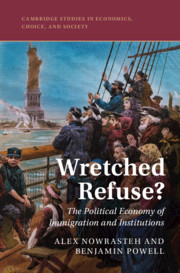Book contents
- Wretched Refuse?
- Cambridge Studies in Economics, Choice, and Society
- Wretched Refuse?
- Copyright page
- Contents
- Tables
- Figures
- Acknowledgments
- 1 Introduction
- Part I State of the Debate
- Part II Cross-country Evidence
- Part III Case Studies in Mass Immigration
- Part IV Assessing the New Economic Case for Immigration Restrictions
- 12 Conclusion
- Bibliography
- Index
12 - Conclusion
from Part IV - Assessing the New Economic Case for Immigration Restrictions
Published online by Cambridge University Press: 10 December 2020
- Wretched Refuse?
- Cambridge Studies in Economics, Choice, and Society
- Wretched Refuse?
- Copyright page
- Contents
- Tables
- Figures
- Acknowledgments
- 1 Introduction
- Part I State of the Debate
- Part II Cross-country Evidence
- Part III Case Studies in Mass Immigration
- Part IV Assessing the New Economic Case for Immigration Restrictions
- 12 Conclusion
- Bibliography
- Index
Summary
We searched for the institutional negative externality posited by the new economic case for immigration restrictions in a variety of ways in this book. We did not find it. In fact, instead we have often found that immigration creates a positive externality that improves institutions related to productivity. There are limitations to all of the methods we have employed in this book. Thus, there is no QED here. We cannot rule out that, in some cases, in some places, from some particular immigrant flows, that a negative externality that undermines formal and informal institutions or norms related to productivity does exist. However, in general, our findings should make scholars skeptical of how widely relevant the new case for immigration restrictions is. Thus, our findings also bolster the standard economic case for free immigration by increasing our confidence that most of the global economic gains that would stem from free immigration do, in fact, exist.
Keywords
- Type
- Chapter
- Information
- Wretched Refuse?The Political Economy of Immigration and Institutions, pp. 273 - 284Publisher: Cambridge University PressPrint publication year: 2020

